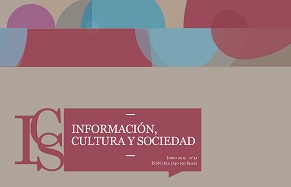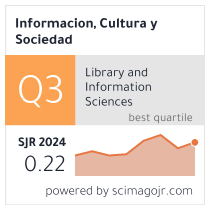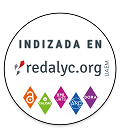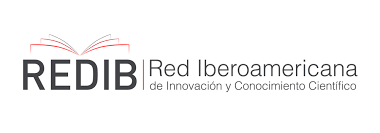Paradigma socio-cognitivo en la Red Social Dreamcatchers en Cuba
Resumen
La Ciencia de la Información en su nacimiento científico está influenciada por dos aspectos fundamentales, uno es el contexto de las tecnologías y el otro es su carácter interdisciplinario. La misma aparece con el propósito de centrar su atención en la información, y la convierte en su objeto de estudio. De ahí que en su desarrollo epistemológico, los paradigmas trazan el camino de estudio y práctica de la información, reflejan el contexto en la que se va desarrollando y cómo este al unísono influye en el desarrollo de esta ciencia. El paradigma socio-cognitivo, en la actualidad, se despliega bajo un contexto diferente, de redes sociales, donde las relaciones entre las personas se manifiestan de forma diferente y por tanto sus comportamientos, necesidades adquieren otra dimensión. Precisamente el tema de la investigación es el paradigma socio-cognitivo contextualizado en la red social "Dreamcatchers" de Cuba, con el objetivo de reconocer la presencia del paradigma socio-cognitivo en la misma. Como resultado fue el análisis del paradigma socio-cognitivo en la red social "Dreamcatchers" a partir de los indicadores propuestos donde se reconoció la influencia de la comunidad en las personas, a partir del análisis estadístico de la información y del software Ucinet.Descargas
Citas
Alarcón Ortiz, Domingo y Antonio Francisco Díaz García. 2013. Las redes sociales entre las TICS y la decadencia moral. En Orbis. Revista Científica Ciencias Humanas. Vol. 9, no. 25, 124-134. <http://www.redalyc.org/articulo.oa?id=70928419008> [Consulta: 11 abril 2017].
Arias, Angélica. 2013. Modelos psicológicos del comportamiento humano. <https://prezi.com/iugxyd7fwjp9/modelos-psicologicos-del-comportamiento-humano/> [Consulta: 10 mayo 2016].
Barreto, Aldo de Alburquerque. 1998. Los tres mundos de la Ciencia de la información. En Revista Ciencias de la Información. Vol. 29, no. 3.
Budd, John. M. 1995. An Epistemological foundation for Library and Information Science. En Library Quarterly. Vol. 65, no. 3, 295-318.
Capurro, Rafael. 2003. Epistemología y Ciencia de la Información. Trabajo presentado al V Encontro Nacional de Pesquisa em Ciência da Informação, realizado en Belo Horizonte, Brasil el 10 de noviembre de 2003. <http://www.capurro.de/enancib.htm#II> [Consulta: 11 enero 2016].
Crovi Druetta, Delia María; María de los Ángeles López y Rocío López. 2009. Redes sociales. Análisis y aplicaciones. México: UNAM; Plaza y Valdés.
Dick, Archie L. 1999. Epistemological positions and Library and Information Science. En Library Quarterly. Vol. 69, no. 3, 305-326.
Ellis, David. 1992. The physical and cognitive paradigms in information retrieval research. En Journal of Documentation. Vol. 48, no. 1, 45-64.
Frohmann, Bernd. 1994. Discourse analysis as a research method in library and information science. En Library and Information Science Research. Vol. 16, no. 2, 119-138. <http://www.sciencedirect.com/science/article/pii/0740818894900043> [Consulta: 11 abril 2017].
García Muñiz, Ana Salomé y Carmen Ramos Carvajal. 2003. Las redes sociales como herramienta de análisis estructural input-output. En REDES. Revista hispana para el análisis de redes sociales. Vol. 4, no. 5. <http://revistes.uab.cat/redes/article/view/v4-garcia-ramos> [Consulta: 11 abril 2017].
Hanneman, Robert A. y Mark Riddle. 2005. Introduction to social network methods. Riverside, CA: University of California.
Hjørland, Birger. 2002. Epistemology and the socio-cognitive perspective in Information Science. En Journal of the American Society for Information Science and Technology. Vol. 53, no. 4, 257–270.
Hjørland, Birger y Hanne Albrechtsen. 1995. Toward a new horizon in Information Science: Domain-analysis. En Journal of the American Society for Information Science. Vol. 46, no. 6, 400-425. <http://onlinelibrary.wiley.com/doi/10.1002/(SICI)1097-4571(199507)46:6%3C%3E1.0.CO;2-A/issuetoc> [Consulta: 11 abril 2017].
Holgado Ramos, Daniel. 2016. Analizando redes sociales. En REDES-Revista hispana para el análisis de redes sociales. Vol. 27, no. 2, 141-145 <http://revistes.uab.cat/redes> [Consulta: 11 abril 2017].
Knoke, David y Song Yang. 2008. Social Network Analysis. 2nd Edition. Thousand Oaks, CA: Sage Publications.
Linares Columbié, Radamés. 2005. Ciencia de la información: su historia y epistemología. Bogotá: Rojas Eberhard.
Linares Columbié, Radamés. 2010. Epistemología y Ciencia de la Información: repensando un dialogo inconcluso. En ACIMED. Vol. 21, no. 2. <http://www.acimed.sld.cu/index.php/acimed/article/viewArticle/52/18> [Consulta: 9 abril 2017].
Linares Columbié, Radamés. 2014. Ciencias de la Información y su análisis epistemológico. En Revista Cubana de Información en Ciencias de la Salud. Vol. 25, no. 4, 459-466. <http://www.redalyc.org/articulo.oa?id=377645759009 > [Consulta: 9 abril 2017].
Lozares, Carlos. 1996. La teoría de redes sociales. En Revista Papers. No. 48, 103-126. <http://papers.uab.cat/article/view/v48-lozares> [Consulta: 11 abril 2017].
Molina, José Luis. 2001. El análisis de redes sociales: una introducción. Barcelona: Bellaterra.
Ørom, Anders. 2000. Information Science, historical changes and social aspects: a Nordic outlook. En Journal of Documentation. Vol. 56, no.1, 12-26.
Pérez Salazar, Gabriel y Andrea Aguilar Edwards. 2012. Reflexiones Conceptuales en torno a las Redes Sociales en las Redes Sociales: un recorrido de la teoría a las prácticas comunicativas en Facebook, Twitter y Google. Importancia de la Comunicación y sus interfaces con los desafíos ambientales. En Razón y Palabra. No. 79, 1-37. <http://www.razonypalabra.org.mx/N/N79/V79/06_PerezAguilar_V79.pdf > [Consulta: 11 abril 2017].
Ponce Leiva, Pilar y Arrigo Amadori. 2008. Redes sociales y ejercicio del poder en la América Hispana: consideraciones teóricas y propuestas de análisis. En Revista Complutense de Historia de América. Vol. 34, 15-42. <https://revistas.ucm.es/index.php/RCHA/article/viewFile/RCHA0808110015A/28432 > [Consulta: 11 abril 2017].
Quintero Castro, Nathalia; Marta Lucía Giraldo Lopera; Isabel Cristina Bernal Vinasco; Carmen Viana Arango y Jair Gonzalo Taborda Ortiz. 2009. Identificación de las ciencias de la información documental. En Revista Interamericana de Bibliotecología. Vol. 32, no. 2, 195-229. <https://aprendeenlinea.udea.edu.co/revistas/index.php/RIB/article/view/5063> [Consulta: 11 abril 2017].
Ramírez Ibarra, Ivalú. 2016. Tres perspectivas globales en Bibliotecología y Ciencia de la Información. En Información, cultura y sociedad. No. 34, 79-92. <http://revistascientificas.filo.uba.ar/index.php/ICS/article/view/2251> [Consulta: 19 septiembre 2016].
Rodríguez Treviño, Julio César. 2013. Cómo utilizar el Análisis de Redes Sociales para temas de historia. En Signos Históricos. Vol. 15, no. 29, 102-141. <http://www.redalyc.org/pdf/344/34428269004.pdf > [Consulta: 19 septiembre 2016].
Rodríguez-Aguilera, Francisco; Nieves Arranz Peña y Juan Carlos Fernández de Arroyabe. 2016. Proceso de adquisición de datos del sistema de correo electrónico: Una aplicación a la modelización de una red social. En REDES Revista Hispana para el Análisis de Redes Sociales. Vol. 27, no 1, 58-72. <http://dx.doi.org/10.5565/rev/redes.589 > [Consulta: 11 abril 2017].
Scott, John. 1991. Social Network Analysis. A Handbook. Londres: Sage.
Scott, John. 2013. Social Network Analysis. Third Edition. Thousand Oaks, CA: Sage Publications Ltd.
Setién Quesada, Emilio y Nuria E. Pérez Matos. 2008. Bibliotecología y Ciencia de la Información: enfoque interdisciplinario. En ACIMED. Vol. 18, no. 5, 3-65.
Velázquez Álvarez, O. Alejandro y Norman Aguilar Gallegos. 2005. Manual introductorio al análisis de las redes sociales. México: Universidad Autónoma del Estado de México, Universidad Autónoma Chapingo. <http://revista-redes.rediris.es/webredes/talleres/Manual_ARS.pdf > [Consulta: 10 mayo 2016].
Wasserman, Stanley y Katherine Faust. 1994. Social network analysis: methods and applications. Cambridge, UK: Cambridge University Press.
White, Howard D. y Katherine W. McCain. 1998. Visualizing a discipline: an author co-citation analysis of information science, 1972-1995. En Journal of the American Society for Information Science. Vol 49, no.4, 327-355. <http://citeseerx.ist.psu.edu/viewdoc/download?doi=10.1.1.95.6296&rep=rep1&type=pdf> [Consulta: 11 abril 2017].
Los autores/as que publiquen en esta revista aceptan las siguientes condiciones:
- Los autores/as conservan los derechos de autor y ceden a la revista el derecho de la primera publicación, con el trabajo registrado con la Licencia Creative Commons Atribución-CompartirIgual 4.0 Internacional, que permite a terceros utilizar lo publicado siempre que mencionen la autoría del trabajo y a la primera publicación en esta revista.
- Los autores/as pueden realizar otros acuerdos contractuales independientes y adicionales para la distribución no exclusiva de la versión del artículo publicado en esta revista (p. ej., incluirlo en un repositorio institucional o publicarlo en un libro) siempre que indiquen claramente que el trabajo se publicó por primera vez en esta revista.
- Se permite y recomienda a los autores/as a publicar su trabajo en Internet (por ejemplo en páginas institucionales o personales).


























